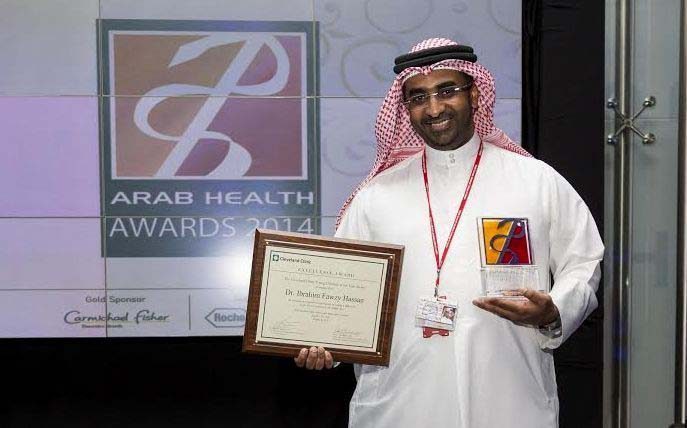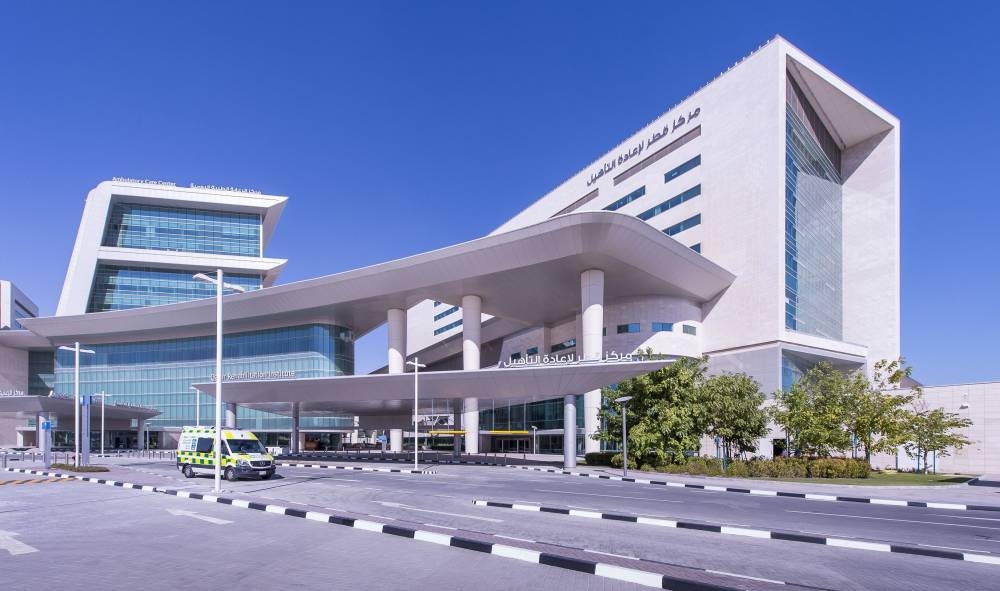
A 38-year-old Qatari doctor who is working to bring a new therapy for Middle East Respiratory Syndrome (MERS) to the region and working on ways to transport critically ill patients to hospitals has been named Young Clinician of the Year at the Arab Health Achievement and Innovation Awards in Dubai.
Dr. Ibrahim Fawzy Hassan, Director of Hamad Hospital’s Intensive Care Unit, was awarded the title by the prestigious Cleveland Clinic, one of the US’s top-ranked hospitals. His prize includes an all expenses-paid week at the clinic in Ohio, observing clinical care at the facility.
The Young Clinician of the Year Award is awarded to a doctor under the age of 40 who is judged to have made “a positive impact on the lives of their patients” in the region.
Doctors are nominated by their employers or peers – Hassan was nominated by HMC – and the Cleveland Clinic judges nominees on their medical knowledge, leadership skills, compassion, and commitment to continuing their medical education, among other criteria.
Experience
The judges said they awarded the prize to Hassan due to his “stellar record:”
“His energy, initiative and dedication to improving the quality of care makes him an ideal recipient of the Cleveland Clinic Young Clinician Award,” they said in their judgement.
“His extensive training and commitment to furthering his medical knowledge and skill set have been the foundations upon which he has built his career. He has played a vital role in raising the awareness of the community, and promoting health in Qatar.”
Hassan received his medical degree in Kiev in the Ukraine, before taking up his residency with Cornell University in the US.
He then returned to Qatar for two years, before heading back to the US for a further seven to study three specialties: pulmonary medicine, internal medicine and critical care. He moved back to Qatar in 2011 to take up a job at HMC.
Transport medicine
In its nomination, HMC lauded Hassan’s work in both the Intensive Care Unit and in another of his roles, as deputy medical director of Qatar’s ambulance services.
It is in the latter department that he’s been spearheading the relatively new area of Transport Medicine – which studies the best way to transport critically ill patients within Qatar and to hospitals abroad.
Inside the nation, Hassan has helped to assemble a special team of highly trained paramedics to transport such patients. He has also established a “Critical Care Registry,” a collection of data from the country’s intensive care units, to help HMC compare its performance to similar hospitals worldwide.
Speaking to Doha News, the doctor said:
“We can see how good we are and where we want to improve. We need to know our strengths and weaknesses.”
In terms of transporting patients abroad, he said establishing special guidelines for this “is very new and we are adapting.” Hassan continued:
“We have around 400 patients per year who leave Qatar to go abroad to get extra care, and the way they are transported until now is not the best way – it’s done in a regular flight, and the teams are often not very well equipped. So we’ve assembled a team who are getting extra training for aeromedical medicine, and specialized equipment.”
Hassan’s team have also designed a special patient compartment area, so patients will be separated from the rest of the passengers during a flight – a concept currently only used by German airline Lufthansa.
The team are currently in negotiation with Qatar Airways to decide whether to equip two small planes for medical transfers, or whether to use the patient compartment in existing aircraft, he added.
Hassan also spoke of another current project he he described as “very important” work. He’s currently leading a team that is working to bring a new therapy for MERS to Qatar, a first for the whole region.
“It’s called ‘extra corporeal membrane oxygenation’ – essentially, you connect a patient to a machine which oxygenates all of their blood. It’s risky, but with the right expertise, it improves survival,” he said.
Currently, the treatment is only available in the UK, USA and Australia. The new center in Qatar should be operational by the end of 2015, he added.
Local expertise needed
A recent report identified a lack of Qatari doctors as one of the key challenges facing the healthcare industry ahead of a predicted 240 percent increase in demand for services by 2025.
Currently, some 69 percent of doctors and 91 percent of nurses in Qatar are recruited from abroad, and many of these expats view their jobs as a temporary stopgap, the report by management consultants McKinsey & Company stated.
This leads to a constantly shifting skill base within the country’s healthcare sector, and results in varying training standards, cultures and procedures.
When asked how he would persuade more Qatari young people to take up a medical career, Hassan highlighted the rewards of the job, which he said “were not in prestige, but in the knowledge that you’ve made a difference:”
“There’s a lot of joy in my profession. If you are the reason that someone survived – for them to get better and to get rid of pain – that’s the best joy you can ever have. It’s wonderful to see someone come in to the hospital almost dead, and later walk out and have his life back, and his family back.”
Thoughts?







